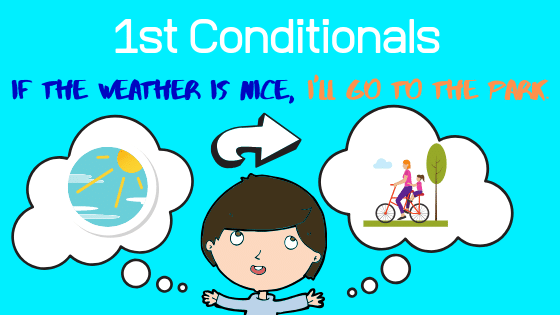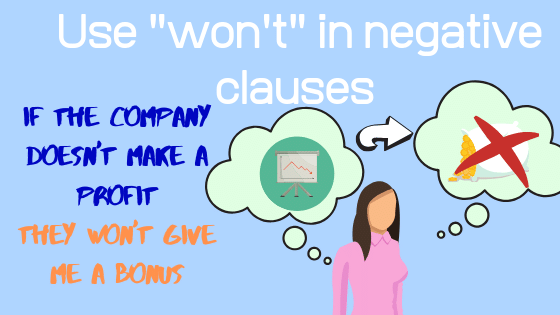
Watch the video explanation
The 1st conditional
Next, let’s move onto the 1st conditional, here there is probability and chance at play,
the result is no longer 100% certain. We use the 1st conditional when we believe the
condition and result can (and probably will) happen in reality, but they are not 100%
certain like the zero conditional above. It is formed by using the present tense
in the condition part of the sentence and most often the future tense with
“will” in the result part of the sentence:
If + present tense, (comma) + future with “will”
[condition] [result]
OR
future with “will” (no comma) + if + present tense
[result] [condition]
For example:
If the company wins the contract, they will
give me a bonus.
[affirmative condition] [affirmative result]

If the company doesn’t make a profit, they won’t give me a bonus.
[negative result] [negative condition]
Using the 1st conditional for warnings.
The 1st conditional is also used to warn others of the probable results of certain actions, we often hear these types of warnings between parents and children or teachers and students etc. For example:
If we don’t hurry, we’ll miss our train.
[condition] [result]
OR
We’ll miss our train if we don’t hurry.
[result] [condition]
Using other modal verbs instead of “will” in the 1st conditional
We can also use modals like “can,” “may / might,” “must,” and “should,”
as well as imperatives (verbs giving instructions) in the result part
of the sentence instead of “will”. Modal verbs change the certainty
of the result.
For example:
If the children finish their homework, they can play outside.
OR The children can play outside if they finish their homework.
If you buy a lottery ticket you might win.
OR You might win if you buy a lottery ticket.
If she orders the present now, it should arrive before his birthday.
OR The present should arrive before his birthday if she orders it now.
If you ride a motorbike, you must wear a helmet.
OR You must wear a helmet if you ride a motorbike.
If you don’t know what to do, ask me.
OR Ask me if you don’t know what to do.

No comments:
Post a Comment